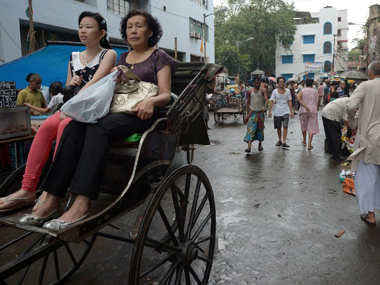Happy tidings may be in store for India’s travel and tourism sector in the years to come, a global report released recently suggests. India will see the fourth highest growth in the tourism sector in the world in the period between 2018 and 2028, a report by the World Travel and Tourism Council has said. The council is a group of CEOs in the travel and tourism sector from across the world. The report also predicts that contribution of tourism to Gross Domestic Product (GDP) in the country will rise from 3.7 percent in 2017 to 3.9 percent in 2028. According to it, the sector directly contributed Rs 5,943.3 billion in 2017, while it is expected to contribute Rs 12,677.9 billion to the economy in 2028. [caption id=“attachment_4403215” align=“alignleft” width=“380”]  Representational image. AFP[/caption] The World Travel and Tourism Council’s report also suggests that the sector will employ more people in 2028 than at present. In 2017, the sector directly supported 5 percent of the total employment. This figure is expected to rise to 5.3 percent by 2028. A similar increase is predicted in total contribution to employment, which includes jobs indirectly generated by the tourism sector. While the total employment supported by tourism was 8 percent in 2017, it is expected to rise to 8.4 percent in 2028. Indirect contribution of tourism to GDP includes investment spending for the sector (such as constructing hotels, purchasing new aircraft), government collective spending and purchases of goods and services by hotels, travel companies, etc. The report includes both domestic and international tourism. However, the report also highlights some worrying aspects. Although tourism’s contribution to employment in India is the second highest in the world (after China), in terms of contribution to GDP, it ranks eighth globally. The disparity is even starker when one looks at the contribution in percentage terms. While India ranks 58th in the world in terms of percentage of contribution to employment, it ranks 91st in terms of percentage of contribution to GDP. Neighbouring Sri Lanka is only one place ahead of India in terms of employment but is 33 places ahead in terms of contribution to GDP. However, there appears to be some improvement in the situation. According to the 2017 annual report of the tourism ministry, the total contribution of tourism to GDP increased marginally from 6.77 percent in 2009-10 to 6.88 percent in 2012-13. The total contribution of tourism to employment showed a more substantial increase, rising from 10.17 percent in 2009-10 to 12.36 percent in 2012-13. While spending by foreign tourists was 12.8 percent of the total, spending by domestic tourists was 87.2 percent of the total, according to the report. India fares better than South Asia on an average in terms of contribution of tourism to employment as well contribution of tourism to GDP. On the former, India’s percentage is 5 as against 4.5 for South Asia. On the latter, India’s percentage is 3.7 percent as against 3.6 percent for South Asia.
Happy tidings may in store for India’s travel and tourism sector in the years to come, a global report released recently suggests.
Advertisement
End of Article


)

)
)
)
)
)
)
)
)



